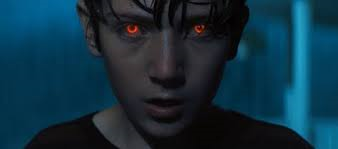From
Spun director Jonas Akerlund, comes Lords of Chaos, the inherently satirical
real-life Goodfellas-esque bio pic, about the Norwegian black metal band Mayhem and their decent into extreme vandalism and murder in the
streets and plains of Norway, burning churches down and murdering innocent
people, all in the name of marketing.
Based
on real events, Oystein (played by Rory Culkin) is the leader of his band Mayhem in late eighties Norway. When his
lead singer commits suicide, Oystein uses this as a stepping off point to
become a legend, creating the black metal scene in Norway through insinuation
of murder involving his singer’s death. This opens a can of actual mayhem when
“poser” Varg enters Oystein’s world as a fan, but who does literally anything
to become Oystein’s disciple beyond what Oystein ever wanted; including
terrorism. Creating the real life Norwegian black metal crimes of the 1990s,
that plagued Norway and reinforced the “satanic panic” of that era.



Whether
or not the events are portrayed accurately, Lords
of Chaos responsibly dissects the intense problems of masculinity, which
lead to bullying, humiliation and psychologically forced violence all to “fit
in”. As well as It’s connection to the music industry, industry and marketing
as a whole. Lords of Chaos isn’t
afraid of expressing the humour in displaying the absurdity and ridiculousness
of mixing false integrity with extreme marketing tactics to make money and to
become famous within the metal scene, and especially within that era of metal.
The idea of rich white kids, who eat shawarma wraps and listen to and play loud
music wanting something more out of nothing, can easily lead themselves to
suicide, heinous acts and Nazism, out of boredom, belonging, extreme
disillusionment, capitalism and bullying. Paired with confused understandings
of constant horror imagery and literature of the occult. Lords of Chaos reiterates that the Norwegian black metal scene is
no different than any other music scene as far as it’s goals, and can be
enjoyed as such, but when taken beyond that in order to prove something, no
good can be had. Within any group, band or gang.


Jonas
Akerlund’s direction darkly and viciously displays the psychosis of the boys
involved in these disturbing crimes, and the confusion between their love of
black metal images and sounds and terrorist attacks, with black and white
flashed scenes and monstrous CGI interpretations of the devil and murder.
Portraying Oystein’s cringe inducing nightmares of finding his lead singer
dead, and what led him to suicide and the literal demons beneath it. All
personified through the culture of Norwegian black metal genre, horror movies
and Satanism. Helping us understand Oystein’s regret of creating this culture
and inducting Varg.

The
casting of Rory Culkin as Oystein and Emory Cohen as Varg is inspired. As
Rory’s piercing blue eyes, short stature, gaunt appearance and creepy, wispy
but reassuring voice, perfectly portrays a guy who can influence someone but
who also can be defeated and proven wrong easily, and feels the need to
sheepishly lie to get his way but then regrets it. Emory’s self-deprecating
portrayal of Varg, who eventually become villainous through bullying, is well
measured and thought out, giving us a clear-cut understanding of how Varg would
bluntly transition from calm, respectful loner to a forceful, Nazi obsessed
tormentor terrorist, in a white toxic masculine music scene.


By
the end, Lords of Chaos becomes
something of a true horror film, but not just to be gratuitous and portray the
brutal reality of what happened within these crimes, but to show how certain
members of the group saw the execution and self importance of what they were
violently committing, opposed to what it actually looked like.
If
you want a better understanding of the 1980s - 1990s era of black metal and
where it all came from, and reassurance that the music industry and toxic
masculinity is the same no matter where you go. Lords of Chaos explores that perfectly, with a great early 90s
black metal soundtrack that is sure to please fans, and is far more deserving
of a rating beyond 67% on Rotten Tomatoes. 9/10. See it.





















































